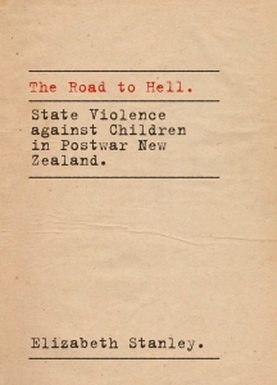
The Road to Hell: State Violence against Children in Postwar New Zealand
by Elizabeth Stanley
Dr Elizabeth Stanley’s biography indicates that state crime and human rights are two of her research interests, and The Road to Hell, no less than her publications list, certainly bears out that statement.
The text is just under 101,000 words long and is supported by three comprehensive appendices, fifty pages of superbly-detailed notes and a full index. If taken together these illuminate more than adequately one aspect of the story of state intervention in children’s lives in New Zealand, and the aspect chosen by Dr Stanley is both dark and alarming.
Stanley advances her arguments in twelve chapters, grounding the whole in the social changes wrought by the aftermath of World War II. She argues that the economic circumstances experienced by the ‘baby-boomers’, circumstances as diverse as steady urbanisation, the growing visibility of Maori, changing social mores such as those brought about by the availability of the contraceptive pill, economic downturn in the wake of the EEC and a rising unemployment that contrasted with the boom years of the 1950s all combined to produce welfarism of a sort with which NZ society struggled to cope.
Changes to ‘traditional’ family structure and values propelled the state into the role of primary carer, and she argues that it was always under-prepared, under-trained and under-resourced to do so effectively. Apart from having implications for the quality of care offered and provided, along the way state incompetence produced several undesirable aspects to the salient features of the state-sponsored system of care.
These included what one might term ‘the institutionalisation of the institution’. Put otherwise, the view that children’s future was to centre upon and around the institution. This meant, she argues, that the institution could not be wrong in its views and structures, so that rebellion, dissent, challenge and resistance merely underlined the difficult nature of the material with which the institution was obliged to work and that its need to control inevitably cast the child as blameworthy victim.
In its turn, the need to control justified a variety and sequence of appallingly punitive measures including treat and leave deprivation, harshly excessive PT, chores that were designed to humiliate rather than to produce effective contribution to anything, solitary confinement, the nightmare of ECT and ultimately what Stanley terms ‘up-tariffing’ whereby children experienced increasing levels of onerous imprisonment up to and including jail time. All this, be it remembered, practised upon many children who were in care only through the dysfunction of their homes and not themselves.
The result, argues Stanley as a result of her interviews of the sample of 105 ex-state wards, is an ongoing history of reduced circumstances that include relationship failure, poor housing and healthcare, financial problems, abandonment by support services and a high rate of unemployment.
These conclusions are drawn from a numerical sample of about the size of the numbers attending the average 21st or wedding anniversary party, and are justified only in the phrase “(Ex-state wards’) stigmatisation means that any aspirations for a positive future are systematically shut down.” (p164).
This is where one begins to suspect that the pudding may be a touch over-egged, for there is no attempt made to contrast the experiences of the chosen 105 with others. It is certainly true that the parameters of the book are defined in the title as a story of ‘...state violence against children in postwar New Zealand’ and not, say, “a short survey of children in welfare care in postwar New Zealand”. However, and as Weber reminds us, “All knowledge of cultural reality...is always knowledge from particular points of view” and throughout Dr Stanley’s book a determined anti-state position does, in fact, show through.
This is nowhere more clearly evidenced than in her delineation of early attempts to deal with the earliest signs of social breakdown in the post-war period, attempts which she defines as indicative of an ‘expanding control industry’ and which saw welfare officials and Youth Aid police ‘looking for ways to fill their day’ using ‘children’s previously unremarked-upon problems or delinquencies…formalised into events that required further attention.’ (p33).
Dr Stanley notes, sometimes repetitively, how difficult it is for victims seeking redress to come forward with their stories. Despite the 21st century being a much different world from that of the second half of the 20th in terms of society’s willingness and even eagerness to grapple with social problems that were formerly swept under any available carpet – viz marriage breakdown, alcoholism, mental illness, STDs, extramarital pregnancy and the re-discovery of birth parents to cite a few – she claims that doing so results in an unacceptable ‘re-victimisation’ of ex-wards.
Again, even where a contemporary (2015) report into the way forward for Child, Youth and Family concerns recommends a child-centred approach in preference to a process-centred one, Dr Stanley rather sneeringly dismisses it as being, inter alia, ‘an actuarial approach to reduce government expenditure.’ (p200).
Other examples include a statement from one of her interviewees that ‘...an apology at the very highest level’ would be welcome which becomes, in Dr Stanley’s translation, ‘...a frank, sincere apology from the Prime Minister of New Zealand.’ She appears to overlook the convention that such apology is traditionally offered by responsible ministers and not by the Prime Minister.
In summary, Dr Elizabeth Stanley has written a well-researched and intensive study of a darkly concerning part of the story of New Zealand’s attempts to grapple with the issues raised by social dislocation in the post-war period. One has no doubt that the importance of that aspect to her interviewees and respondents cannot be overestimated, but its importance in the context of other aspects of the same story begs the appearance of the work necessary to allow comparison and judgement.
MA (Waikato); BA; MEd Admin (Massey)
Title: The Road to Hell: State Violence against Children in Postwar New Zealand
Author: Elizabeth Stanley
Publisher: Auckland University Press
ISBN: 9781869408541
Available: bookshops

 RSS Feed
RSS Feed
